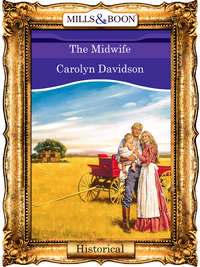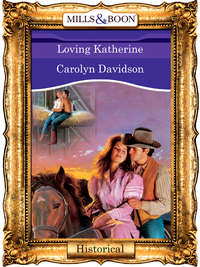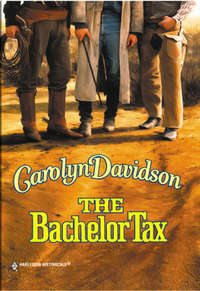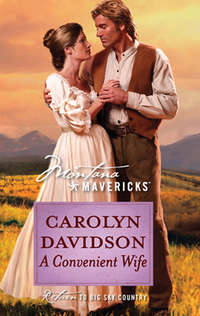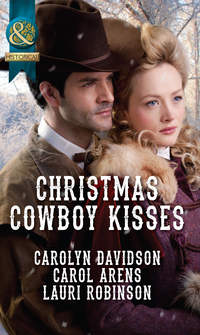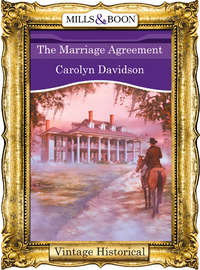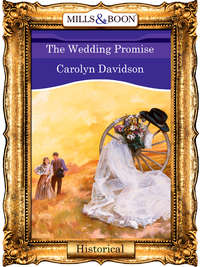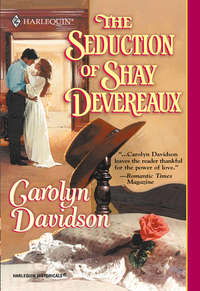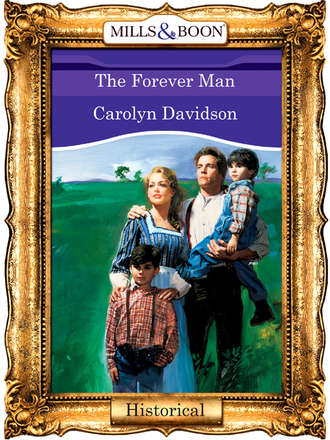
Полная версия
The Forever Man
A wave of sympathy for the woman he’d married hit Tate with the force of an afternoon storm. She’d been alone here for years, living with her father, but as solitary as any human could be. Suddenly the wall of bristling, cutting words she’d thrown up between them at their first meeting made sense. Johanna Patterson was more than a lonely woman. She was hurting, and wary of any advances.
“Is it time to eat?” Timmy’s treble voice through the screen door broke the silence that had fallen in the kitchen. His nose pushing up against the wire mesh, he squinted as his eyes adjusted to the dimmer light inside.
“Come in, boys.” Johanna smiled at them, welcoming their presence. She could cope with them, talk with them, serve their food and get through this meal with a minimum of contact with their father. She watched as Pete pulled the door open, stretching the spring as far as he could, waiting for his brother to step inside, then allowing the door to slam behind him. His eyes lit with a degree of satisfaction as he darted a look in her direction.
“Don’t let the door slam next time, Pete,” his father said firmly.
“Yessir,” the boy replied, ducking his head deliberately as he spoke.
“Your hands clean?” Tate asked, frowning at his eldest son.
“I washed mine, Pa,” Timmy volunteered, holding up the items in question, his palms still wet and glistening.
“Pete?”
“They’re clean, Pa,” the boy mumbled. “We used the pump outside.”
Johanna pulled out the chair to the right of her own. “Sit here, won’t you, Timmy? Take the chair across from your brother, Pete.” She clasped her hands before her, watching as the boys did her bidding, aware of the man who stood across the table, his own hands clasping the back of his chair. Finally she felt herself snagged by the strange warmth of his gray eyes.
“Sit down, Johanna. Everything looks fine. We need to eat before it gets cold.” He waited for her to take her place, not allowing her to attempt retreat.
And the thought had passed fleetingly through her mind. Only the presence of the two children made it feasible for her to eat with any pretense of ease and affability. She waited while Tate bowed his head and asked a brief blessing on the food, then busied herself with fixing Timmy’s plate, cutting his meat and watching as he took the first bite. As she’d noticed yesterday, his chin came only inches above the tabletop. Now he tilted it to ease the passage of his potato-laden fork as he aimed it toward his mouth.
“Would he do better with a pillow under him?” Johanna asked.
“I thought maybe a chunk or two of firewood would work,” Tate said with a grin.
“I can kneel, Pa,” Timmy volunteered cheerfully. Depositing his fork on the table, he scrambled to his knees and leaned back on his heels. “This will work good,” he announced, setting to with renewed energy, now that he could reach his food more readily. “I was hungry, Miss Johanna.”
For the first time in days, Johanna’s mouth curled in genuine humor. The child’s glee was infectious. “I’m glad you’re hungry, Timmy. I like to cook for hungry men.”
Across the table, Pete ate slowly, as if he begrudged every bite passing his lips. His eyes were downcast, his fork held in his fist like a weapon, his whole demeanor morose.
Johanna watched the older boy from beneath her lashes as she ate, wanting desperately to speak his name, to have him look up at her with open, cheerful good humor, yet knowing she must not infringe on his mood. His was about as far from a good mood as east was from west, and she wasn’t about to get him in trouble with his father.
“Did you bring in everything from the barn, Pete?” Tate’s query was pleasant, as if his son’s ill will were not apparent.
“Yessir, it’s on the porch like you told me.” Green beans disappeared between his teeth, and he chewed diligently.
“Me too, Pa. I brung my stuff, my pillow and everything.” Timmy’s grin encompassed the table and all three of his companions. “When can we bring in the beds and stuff we brought?”
Johanna’s head lifted, her gaze meeting Tate’s abruptly. “You brought furniture with you?”
He nodded. “Some. I wasn’t sure what we’d need. I didn’t even know where we were going. I brought a supply of tools, too, some I didn’t figure I’d want to have to replace. The boys wanted their beds and the feather ticks their aunt Bessie made for them, and some trunks I made them.”
“You didn’t tell me,” she said, thinking of the big double bed she’d outfitted with clean sheets in her old bedroom. “We could have brought their things in last night.”
“We had enough to do last night, what with getting your mother’s room all fixed up for you.”
“Well, I’m sure we can get the boys’ things into the house after dinner and get them settled in. They’ll want to put their clothes away in the wardrobe and dresser.”
“Most of my stuff is dirty. Pa has to wash it,” Pete said gruffly. “We didn’t stop to do the washing for a long time.”
Tate’s smile was teasing. “I wasn’t going to tell Miss Johanna about that till tomorrow, son. There wasn’t any sense in scaring her off the first day. It’ll take half the morning to scrub out the pile of things we’ve managed to accumulate.”
“I’m used to laundry. My scrub board works real well,” Johanna said obligingly. “Bring your things on in and put them in the washroom.”
“You wash indoors year-round?” Tate asked.
“Pretty much. It gets cold here early on. We’re not far from the big lake, and when that west wind blows, I don’t enjoy being out in it, up to my elbows in wash water. My father built a washroom for Mama when he built this house. It’s bad enough I have to hang things outside in the winter. Mama used to carry them up to the attic sometimes, when the weather got real bad, and string a line to put them on.”
“What’s wrong with a rack behind the stove?” Tate eyed the space between the cookstove and the wall, measuring it in his mind.
“I never thought of that. I didn’t know they made such things,” Johanna said.
“I can put one together for you. It won’t hold everything at once, but things dry pretty good. Beats standing out in a cold wind, with a wet sheet flappin’ in your face.”
“Pa! Can we have pie now?” Timmy was plainly tired of the talk of laundry day, and his voice was querulous as he attempted to change the subject. His plate was empty of food, his fork still held upright in his hand, and his eyes were glued to the apple pie sitting on Johanna’s kitchen cupboard.
She scooted her chair back from the table. “Let me clear these things off first. Hold your fork tight, Timmy. You’ll need it for the pie.”
“I like mine in a bowl with cream over it,” Tate said with a grin. “So does Pete.”
“My aunt Bessie makes good pie,” Pete offered stoutly.
Johanna’s gaze met Tate’s. It was easier this time. “Did you have apple trees on your place?”
He shook his head. “No, Bessie got them in town at the general store. She used to dry them to use in the winter. The boys spent some time with her…. She liked to fuss over them.”
“We could have stayed there, Pa. Aunt Bessie said we could, remember?” Pete reminded him.
“It wasn’t a good idea, son.” Tate’s firm words dismissed the idea, and the boy sighed loudly, eliciting another stern look from his father.
The wedding had changed him, Johanna thought sadly. The cheerful child of the night before had vanished, and she mourned his departure. It would take some doing to bring him back, she feared. Rising from the table, she quickly took up the plates, bringing the pie back with her. The pitcher of cream she’d poured for their coffee was still over half-full—probably enough for Tate’s pie, too, she thought She watched as he poured it over the slice she cut for him, watched as he lifted the first bite to his mouth, watched as his lips closed over the forkful of crust and filling. And felt a small bubble of rejoicing within her as his smile pronounced it good.
“It’s as good as your aunt Bessie’s, isn’t it, Pete?”
The boy was silent, eating slowly, as if unwilling to allow any enthusiasm to creep forth.
Timmy had no qualms about expressing his approval. “You’re a good cooker, Miss Johanna.” It was high praise indeed, delivered with a flourish of his fork, crumbs surrounding his mouth, his eyes shining with glee.
“Yes, she is, isn’t she?” his father agreed.
Johanna felt a blush paint her cheeks. She’d had more compliments during the past two days than she’d had in years. Tate Montgomery would fix himself a place in her life with his courtly manners and his gentle smiles, if nothing else.
The sun had gone down in a burst of splendor, leaving an autumn chill. Johanna had brought her shawl from the parlor, where it was usually draped over her mother’s overstuffed chair, awaiting her use on cool evenings. Now she stood on the porch, watching warily as Tate carried another load of his things from the barn. He was truly moving into her house, and she felt a moment of apprehension as she considered that thought.
“This is the last of it,” he said, resting one foot on the bottom step. He looked up at her, his eyes measuring. “What is it, Johanna? Are you fearful that I’ll forget my bargain with you? That I’ll forget which parts of the house I’m welcome in and which part is off-limits to me?”
She hadn’t expected it, his ability to know her mind, and she clutched the shawl closer, as if the wind had sent a chill through her. “No, I’m not afraid of you, Tate. I told you that already. I’ve seen that you’re a gentleman. I’m sure you’ll hold up your end of the bargain.”
He climbed the three steps to the porch. “Open the door for me, will you? I really loaded myself down this trip. I wanted to get all of it.”
Johanna eyed the three boxes he carried. “Those look heavy. Can I help?”
“No.” He shook his head. “They’re mostly books. Some papers, too, and the contents of my desk. It’s a big thing—probably foolish of me to pack it on the wagon, but I hated to leave it behind. I kept my records in it, and all the paperwork it takes to run a farm and family in one place, back in Ohio.”
“There’s a small room off the dining room you can have if you like,” Johanna offered. Her face grew pensive as she thought of the evenings she’d spent by herself over the past ten years, wondering what her father did in that small room, while she sat by herself in the kitchen or in the parlor.
“Is it furnished?”
“Somewhat. You may as well bring those things on in here,” Johanna said, leading the way. She went through the kitchen, into the formal dining room, which had been used so seldom that she kept the table and buffet covered with sheets. Across from the three wide windows was a door, and it was there that she headed. Turning the knob, she stepped within.
“It’s dark in here,” she called over her shoulder. “But there’s not much to trip over. My father only kept a chair and ottoman by the window, and a table for his lamp and account books.”
Tate looked around in the shadowed interior of the small room. An air of musty disuse assailed him, and he wrinkled his nose. “We need to open the windows in the morning and let in some fresh air and sunshine,” he told her, bending to deposit his boxes on the floor against one wall.
“I haven’t been in here since he died,” Johanna admitted quietly. “It was his room. I guess I didn’t feel welcome, even after he was gone.”
“You’ll be welcome, once it’s mine.” As a statement of fact, it couldn’t have been any plainer. Tate would harbor no secrets from his wife. She doubted he would leave his bedroom door ajar for her to peek inside, but this room would be a part of the house once more.
Maybe she’d even remove the coverings from the dining room furniture and use the room for Sunday dining, as they had when her mother was alive. The thought cheered her.
“This is still your home, Johanna. When I pay off your mortgage this next week, it will be in my name along with yours, but the house is still whatever you want it to be.”
She looked up at him, peering to make out his features in the dim light. “That all sounds well and good, Tate, but as a man, you have more rights than I’ll ever have. I wouldn’t have agreed to this if I wasn’t pretty sure of you. As far as I know, a woman only has the rights her husband allows her, no matter what the deed says.”
“It’s a matter of trust, isn’t it? When it comes to the bottom line, Johanna, you have to trust me. Can you do that?”
“Can I trust you? To keep up the place? I suppose so. Just don’t expect more than that of me. I’ve learned to take care of myself over the years. I don’t need anyone to do for me. I’ll let you tend to the heavy work, gladly. But I’ll not come to depend on you, Tate. I’ve learned that lesson well. I’ve allowed myself to…care about people. It won’t happen again.”
“You care already for my sons.”
Spoken as a statement of fact, the words drew no argument from her. “Yes, you’re right there. They’re young and helpless. They need someone to tend them.”
“And you don’t?”
“Need someone? No, I’ve learned better.” She folded her arms around her waist, a shiver passing through her slim shoulders beneath the warmth of the shawl.
His eyes caught the movement, even in the shadowed room. “You’re cold, Johanna. Leave this for tonight. Tomorrow will be soon enough to set things to rights in here.”
She walked out the door before him, her steps taking her into the hallway and toward the staircase. “I don’t hear the boys. They must have gone to sleep.” She looked up the stairway, then back at the man who watched her in the lamplight. “Good night, Tate. Will you turn out the lamp when you come up?”
He nodded, handing her the candlestick that waited on the hall table, lighting a match from the box she kept there. “Will you want the lamp lit in your room? Or will this be enough light for tonight?”
“This is fine. I only need to get ready for bed. I can do that in the dark,” she said briskly, suddenly unwilling to feel his eyes on her any longer. “I get up early, Tate. Breakfast will be ready as soon as the cows get milked.”
“I’ll be milking them from now on,” he reminded her. “I may not be as quick as you are at the job.” His grin teased her. “I may need a refresher course.”
She picked up her skirt to take the first step. “You’ll do just fine, I think. No matter, we’ll wait for you. And if you take too long, I’m still able to give you a hand.”
“I’m teasing you, Johanna. I’ve done my share of milking. I won’t make you wait meals for me. Just cook plenty. I plan on working up a good appetite in the barn.”
“I’ve fed you the past two mornings. I have a good idea about your appetite, Mr. Montgomery,” she said smartly.
He watched her climb the stairs, noting the slight sway of her hips beneath the muslin gown she wore. His eyes caught sight of her slim ankles above the low shoes she’d slipped into after church this morning. Limned in the candleglow, her form drew his gaze, her hair a fine halo in the gentle light, giving her an ethereal elegance.
“No, ma’am,” he murmured beneath his breath. “You have no idea at all about my appetite. Matter of fact, till just this minute, I wasn’t sure I had much left to speak of.” And that was the truth, he thought, his grin rueful.
“Good night, Mrs. Montgomery,” he said quietly, even as he heard the latch of her bedroom door shut.
Chapter Six
She’d survived two weeks of marriage. Johanna mentally marked the date on the calendar, and a sense of satisfaction curved her lips in a smile. It had been a busy two weeks, too, what with making several trips to town, facing the glances of the curious the first time out. After that, it had been easier.
Even in church on Sunday, they’d been greeted by one and all, with hardly a raised eyebrow to be seen among the congregation at Johanna Patterson’s quick trip to the altar.
Tate was ambitious, she’d give him that, working from early till late. Today was no exception, breakfast barely swallowed before he hustled out the door. He’d lingered only long enough to place a warm hand on her shoulder, reminding her of a button he’d managed to lose from his shirt last evening. She’d agreed to replace it, her mind taken up with the touch of his hand, flustered by his nearness.
And then he’d been gone, leaving her to consider the strange awareness he aroused within her. He was a toucher; she’d noticed that with the boys, and he was given more and more to gaining her attention with a passing brush of those long fingers and broad palms against her arm or waist when the mood struck him.
From outdoors, a squeal of laughter and a shout from Timmy commanding his brother to “Watch me now!” caught her attention, bringing a smile to Johanna’s lips. Whatever the little scamps were up to, it sounded as if they were enjoying it mightily. Another whoop of glee caught her attention, and she left the sink, wiping her hands on the front of her apron.
From the doorway, she watched as Pete scampered from beyond the side of the barn. He carried handfuls of straw, tossing it in the air, blowing it vigorously, trying without much success to keep one piece afloat on the updraft his small lungs provided.
Johanna laughed, pleased at his carefree expression, relieved that the frown he’d worn like a favorite garment over the past weeks seemed to have disappeared.
“Watch me slide!” Timmy’s high voice demanded attention once more, and Johanna halted midway to the stove.
Slide? What on earth could the child be doing? Where was he playing? The only thing around the corner of the barn was the big strawstack.
And in that moment, she knew.
Spinning on her heels, one hand outstretched to open the screen door, she ran. From the corner of the barn, Pete caught sight of her flying footsteps, dropping the remnants of straw he held, his eyes darkening as he watched her advance.
“Pete, have you been playing on the strawstack?” Her hands held the. front of her dress from the ground as she hurried past him, not awaiting his reply, already certain of what she would see as she rounded the corner.
“Pete? Are you watchin’ me?” Feet poking holes kneedeep as he climbed, Timmy was tackling the far side of the stack, gleefully chuckling as he plunged into the smoothly layered straw.
Johanna’s hand lifted to cover her mouth as she watched, her aggravation at the ruin of the stack diluted by the child’s pleasure. Once more down the slope wouldn’t cause any more damage than he’d already done, she decided with a grimace.
Finally reaching the top, Timmy levered himself into place, and with a final whoop sailed down the smooth slope, landing in a pile of yellow straw. He lifted both hands to his face, brushing the floating wisps of straw from his eyes, catching sight of Johanna as he blinked.
“Did you see me, Miss Johanna?” Pride and laughter fought for supremacy in his chortled query as he knelt at the foot of her ruined strawstack.
“Yes, I saw you, Timmy.” Her voice was a dead giveaway, she knew, all harsh and breathless from her hurried trip across the yard. “You boys had no business climbing the strawstack. You’ve managed to make holes all over it for the rain to get in. It’ll be ruined if we don’t get it under cover before a shower comes up. Your pa has enough to do, without this kind of a mess to take care of.”
Behind her, a snort of impatience announced Pete. “You just don’t want us to have any fun. You think we should just work all the time on your old farm.”
Johanna spun to face him. His jaw jutted forward as he completed his accusations, and his eyes squinted at her in the bright sunlight. Hands stuffed in his pockets, he stood spraddle-legged at the corner of the barn, defiance alive in his glare.
“Don’t you know better than to play in the straw, Pete?” Living on a farm all his life as he had, surely his father had warned him about ruining a stack of straw. Canvas was hard to come by, but once the pile was disturbed, the rain would not slide from its surface, and only the heavy fabric would keep the stack dry and usable.
“My pa always let us have fun back home,” the boy answered, his mouth drawn into a pout.
“I want you to have fun here,” Johanna said quickly. “But not at the expense—” She drew a deep breath. It was no use scolding any longer. She’d only succeeded in making the child angry as it was, and poor Timmy was crouched in a pile of straw, looking as if he were about to be scalped.
“I’m sorry to have shouted at you. What’s done is done.” Johanna reached one hand to Timmy, taking several steps to where he squatted, almost in the cave where she’d pitched out straw from the side of the stack. “It’s time for dinner. Come up to the house and get washed up,” she told him, waiting for him to take her hand.
With a quick look at his brother, Timmy nodded, standing and accepting the hand she offered. “We was just climbing the mountain,” he explained, his brow furrowing, his nose wrinkling as he sought to move a straw resting there.
Johanna swept her free hand through his dark hair, her fingers fluffing the stray yellow wisps from its silken length. Her heart went out to the child, his innocence shining from eyes so blue they reminded her of summer skies.
“We were just playin’, and my pa won’t like it that you yelled at us,” Pete announced stoutly.
“Your pa will have to find a piece of canvas and top off this stack before the afternoon’s over, and you’d better plan on helping him with the chore,” Johanna told him quietly, her aggravation under control.
From the orchard, a shrill whistle caught her ear, and she spun to face the direction where her apple trees stood in neat rows. The tall figure of Tate Montgomery strode through the section where she’d planted several lateripening northern spy trees, his head covered by a wide-brimmed hat. He lifted one arm in a wave, the other hand clasping a bucket laden with apples.
Her heartbeat quickened as she watched him stride through the tall grass, down the slope past the pasture fence and toward the house. His long legs carried him at a rapid pace, and a grin of satisfaction curled his mouth as he neared. So quickly he had found a place here on her farm. Just as rapidly, he’d managed to plant himself right smack in the middle of her every waking thought.
She shook her head, willing the small trickle of pleasure she felt to be subdued. The man was a sight to behold, but she hadn’t the right to…to what? Surely it did no harm to please herself by admiring his broad shoulders and longlegged stride.
That she’d ever considered the young Joseph Brittles to be a likely candidate for her husband those ten long years ago was more than she could fathom now. Now that she’d met Tate Montgomery. Her eyes were fixed upon him as he brushed a path through the near meadow toward her, like a colossus making his way across a field of battle.
“Brought you a bucket of the first Baldwins, Johanna. Thought you could bake some for dinner. Sure would taste good with some brown sugar and cinnamon sprinkled over the top.” He swung the heavy pail easily, as if the half bushel or so of apples weighed but a few ounces, instead of the twenty-five pounds she was certain it contained.
Tilting her head to one side as she considered his request, she nodded. “I can do that. Anybody who picks apples half the morning ought to get a little of the fruit of his labor, I always figure.”
His laugh was boyish in its cheerful exultation, as if he had not a care in the world. The bucket swung, the apples it held brimming over the top, and Johanna was struck by the masculine beauty of the man she’d married. His hair was blown by the breeze, probably tangled by apple branches while he’d poked amid them on the ladder. Sweat staining his shirt in a half circle beneath each arm and his hands soiled by the honest labor he’d done thus far today, he presented a picture she could only admire.
“I’ll carry these to the kitchen for you, Mrs. Montgomery,” he told her, a grin wreathing his face.




